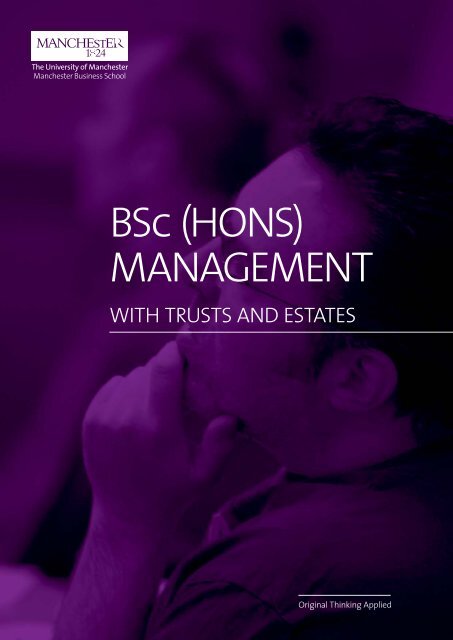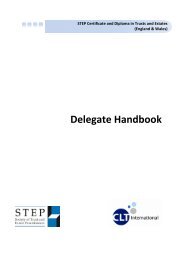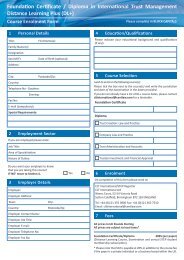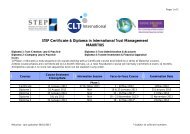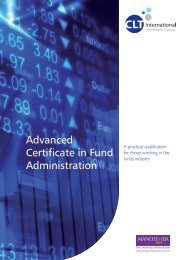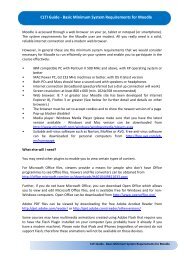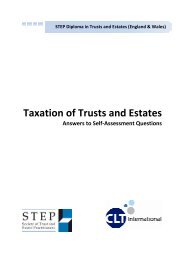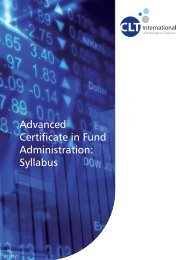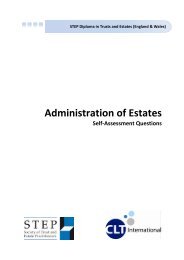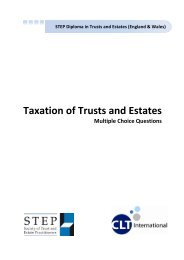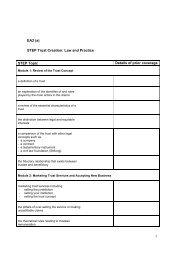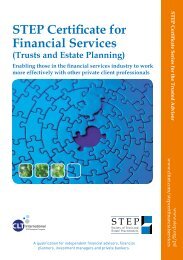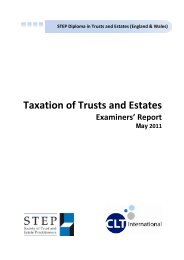BSc (Hons) Management with Trusts and Estates
BSc (Hons) Management with Trusts and Estates
BSc (Hons) Management with Trusts and Estates
- No tags were found...
You also want an ePaper? Increase the reach of your titles
YUMPU automatically turns print PDFs into web optimized ePapers that Google loves.
1<strong>BSc</strong> (HONS)MANAGEMENTWITH TRUSTS AND ESTATESOriginal Thinking Applied
01<strong>BSc</strong> (<strong>Hons</strong>) <strong>Management</strong><strong>with</strong> <strong>Trusts</strong> <strong>and</strong> <strong>Estates</strong>A new part-time degree for trusts <strong>and</strong> estates professionals is nowavailable from Manchester Business School in collaboration <strong>with</strong>the School of Law at The University of Manchester.Manchester Business School providesworld-class business <strong>and</strong> managementeducation <strong>and</strong> is an international,progressive School delivering <strong>and</strong>applying original business thinking <strong>and</strong>teaching.Developed in partnership <strong>with</strong> CentralLaw Training International, this uniquecourse will enable you to build upon yourexisting professional qualifications <strong>and</strong>knowledge in this specialist area, whiledeveloping your management knowledge<strong>and</strong> practical skills.Key features• Learn from internationally acclaimedteaching staff• Study part-time over two yearsto fit around work <strong>and</strong> personalcommitments• Workshops <strong>and</strong> examinations deliveredat weekends• Taught via blended learning – acombination of self study led bytailored study guides, e-learning <strong>and</strong>face-to-face weekend workshops.Key benefits• Internationally recognised academicqualification demonstrating excellencein your subject area• Enhances knowledge of coremanagement transferable skills• Broadened capabilities <strong>and</strong> potentialfor career progression• Workshops provide the opportunityto network <strong>with</strong> academics <strong>and</strong> fellowprofessionals.THIS UNIQUE COURSE WILLENABLE YOU TO BUILD UPONYOUR EXISTING PROFESSIONALQUALIFICATIONS AND KNOWLEDGEIN THIS SPECIALIST AREA.
02Course UnitsYou will study the following compulsorycourse units over the two yearsMarketing <strong>Management</strong>(15 credits)This unit deals <strong>with</strong> the role of marketing, howit fits into the management of an organisation<strong>and</strong> how it interacts <strong>with</strong> other functions<strong>with</strong>in an organisation.The course consists of ten topics:Manchester Business School provides worldclassbusiness <strong>and</strong> management education• Introduction to Marketing• Market Research<strong>and</strong> is an international, progressive School• Segmentation, Targeting <strong>and</strong> Positioningdelivering <strong>and</strong> applying original business• Product <strong>and</strong> Br<strong>and</strong>ing Decisionsthinking <strong>and</strong> teaching.• Services Marketing• Marketing CommunicationsDeveloped in partnership <strong>with</strong> Central Law• Business-to-Business MarketingTraining International, this unique course• Service Quality <strong>and</strong> Customer Satisfactionwill enable you to build upon your existing• Relationship Marketingprofessional qualifications <strong>and</strong> knowledge• Putting it all Together <strong>with</strong> a Marketing Plan.in this specialist area, while developing yourmanagement knowledge <strong>and</strong> practical skills.Strategic <strong>Management</strong>(15 credits)This unit is concerned <strong>with</strong> the goals <strong>and</strong>direction of companies: their strategic priorities<strong>and</strong> how they can achieve them. It analysesstrategy according to the external opportunities<strong>and</strong> challenges facing a company <strong>and</strong> accordingto its internal resources.Key featuresIt will include contributions from stakeholder• Learn from internationally acclaimedtheory <strong>and</strong> complexity theory <strong>and</strong> cover issuesteaching staffsuch as globalisation, sustainability, innovation,• Study part-time over two years to fit arounddigital technology, business transformationwork <strong>and</strong> personal commitments<strong>and</strong> corporate social responsibility.• Workshops <strong>and</strong> examinations delivered atweekendsThe course will cover four main topics:• Taught via blended learning – a combinationof self study led by tailored study guides,• The factors shaping the contemporarye-learning <strong>and</strong> face-to-face weekendbusiness environmentworkshops.• The resources <strong>and</strong> capabilities oforganisations• The alignment of organisations <strong>with</strong> theirexternal environment• The implementation of strategic change.People <strong>Management</strong> <strong>and</strong>Organisations (15 credits)People <strong>Management</strong> <strong>and</strong> Organisationsintroduces a range of concepts <strong>and</strong>frameworks that have been developed forunderst<strong>and</strong>ing individual <strong>and</strong> group behaviourin organisations <strong>and</strong> which can be used to helpanalyse <strong>and</strong> respond to organisational <strong>and</strong>management problems.Key benefits• Internationally recognised academicThe course will consist of ten topics:qualification demonstrating excellence inyour subject area• Underst<strong>and</strong>ing Organisational BehaviourEnhances knowledge of core management• Individuals <strong>and</strong> Organisationstransferable skills• Motivation <strong>and</strong> CommitmentBroadened capabilities <strong>and</strong> potential for• Groups <strong>and</strong> Teamscareer progression• Leadership <strong>and</strong> <strong>Management</strong>Workshops provide the opportunity• Power <strong>and</strong> Conflict in Organisationsto network <strong>with</strong> academics <strong>and</strong> fellow• Perspectives on Work Organisation <strong>and</strong> Jobprofessionals.Design• Structures of Organisations• Organisational Culture• Managing Organisational Change.<strong>Management</strong> InformationSystems (15 credits)This unit aims to foster an underst<strong>and</strong>ing ofInformation Communication Technologies(ICT), the processes of technical innovation,how these processes <strong>and</strong> technologies areshaped, <strong>and</strong> how they impact on individuals,organisations <strong>and</strong> markets. The study isinterdisciplinary <strong>and</strong> draws on literaturefrom business <strong>and</strong> management, informationsystems <strong>and</strong> social science.The course has three themes:• Key concepts of information systems <strong>and</strong> thechallenges entailed in developing,implementing <strong>and</strong> adopting informationsystems. This ranges from in-house, bespokesystems to off-the-shelf packages.• The changing nature of work for an ICTprofessional. This will link to changingbusiness models <strong>and</strong> markets <strong>with</strong>inthe ICT industry.• The impact of information systems onorganisations <strong>and</strong> working life, includingthe uptake of digital technology intodomestic spheres.
03Course UnitsYou will study the following compulsorycourse units over the two yearsAccounting (15 credits)This unit covers aspects of both financial <strong>and</strong>management accounting. Financial accountingdeals <strong>with</strong> underst<strong>and</strong>ing the content <strong>and</strong>usefulness of financial reports published bycompanies. This includes the basic principles offinancial accounts preparation <strong>and</strong> how to read<strong>and</strong> analyse financial statements for decisionManchester making purposes. Business <strong>Management</strong> School provides accounting worldclassdeals business <strong>with</strong> how <strong>and</strong> important management business education decisions<strong>and</strong> are made; is an international, i.e. how to price progressive products <strong>and</strong> School services,delivering how capital <strong>and</strong> investment applying decisions original business are made, howthinking budgets are <strong>and</strong> constructed teaching. <strong>and</strong> how performanceis measured <strong>and</strong> controlled.Developed in partnership <strong>with</strong> Central LawTraining The course International, will cover: this unique coursewill • Financial enable you accounting to build - upon including your examinationexistingprofessional the format qualifications <strong>and</strong> layout <strong>and</strong> of the knowledge mainin financial this specialist statements area, while (balance developing sheet, income yourmanagement statement, cash knowledge flow statement) <strong>and</strong> practical <strong>and</strong> skills. howthey link together• <strong>Management</strong> accounting - including anoverview of various costing methods• Creative accounting; analysing the quality offinancial statements <strong>and</strong> detecting red flags;performance measurement <strong>and</strong> strategicmanagement accounting.Tax <strong>and</strong> Estate Planning(30 credits)This unit comprises two distinct components:Part I - International Financial Planning Tools<strong>and</strong> StructuresThis part provides the theoretical <strong>and</strong>practical foundations underpinning theprinciple Key features financial planning tools needed toidentify • Learn from <strong>and</strong> manage internationally the opportunities, acclaimed issues<strong>and</strong> teaching ramifications staff of complex, cross border <strong>and</strong>international • Study part-time estates over relating two years to inherited to fit around <strong>and</strong>business-generated work <strong>and</strong> personal wealth. commitments• Workshops <strong>and</strong> examinations delivered atThe weekends course will cover:• Principles Taught via <strong>and</strong> blended underlying learning concepts – a combination of wealthplanning of self study tools, led including: by tailored study guides,- e-learning <strong>Trusts</strong>, foundations, <strong>and</strong> face-to-face corporate weekend structures,insurance workshops. <strong>and</strong> investment structures• Utilisation of wealth planning tools: legal<strong>and</strong> regulatory implications. Generationalplanning across borders, including basicprinciples of wills <strong>and</strong> intestacy.• Cross jurisdictional concepts; domicile,nationality, residence• Confidentiality, bank secrecy <strong>and</strong> legalprivilege.Part II - International TaxationThis part provides an overview of theprinciples <strong>and</strong> policies that underpininternational taxation. The course unit focuseson selected international tax problemsof contemporary significance <strong>and</strong> globalapplications to financial planning toolsincluding the use <strong>and</strong> application of multi <strong>and</strong>bi-lateral treaties affecting wealth structures.Key benefits• The Internationally course will cover: recognised academic• qualification The public international demonstrating law of excellence taxationin• your The problem subject area of double taxation• Contemporary Enhances knowledge issues, of for core example, management harmfultransferable international skills tax competition - OECD <strong>and</strong> EU• initiatives. Broadened Relationship capabilities <strong>and</strong> between potential trade for <strong>and</strong>career taxation progression in the context of the WTO.• Regional Workshops tax provide harmonisation the opportunity issues,to particularly network <strong>with</strong> in the academics EU <strong>and</strong> fellow• professionals.Outline international tax planningmethods, for example, transfer pricing,treaty shopping, tax havens.Finance (15 credits)The Finance unit covers topics in the areas ofcorporate finance <strong>and</strong> international finance. Itintroduces concepts of modern finance theory,including aspects of capital budgeting, <strong>and</strong> theuse of present value <strong>and</strong> real options methodsto evaluate investment decisions. It also coverstheories related to firm transactions in foreignmarkets, including foreign exchange risk.The course will cover:• Introduction to modern finance theory <strong>and</strong>practice- The time value of money- Investment decision rules- Basic capital budgeting- Valuing stocks <strong>and</strong> bonds• Capital markets <strong>and</strong> the pricing of risk- The cost of capital- Capital market efficiency <strong>and</strong> investorbehaviour• Firm capital structure- Firm capital structure in a perfect market- The effect of debt <strong>and</strong> taxes on the capitalstructure of the firm- Firm payout policy• Firm short- <strong>and</strong> long-term financing- Equity <strong>and</strong> debt financing- The payout policy <strong>and</strong> firm value• International finance.
04Essential Facts<strong>BSc</strong> (<strong>Hons</strong>) <strong>Management</strong> <strong>with</strong> <strong>Trusts</strong> <strong>and</strong> <strong>Estates</strong>How is the course taught?The course is taught via blended learning.Study hours are 100-150 hours per course unit.What is the method of assessment?Assessment is based on a combination ofcoursework assignments <strong>and</strong> examinations.Where are the workshops <strong>and</strong> examinationsheld?Each 15-credit course unit includes a weekendlongworkshop taught by Manchester BusinessSchool academics. There will be eight weekendworkshops <strong>and</strong> four examination days in totalover the two years. These are delivered in fourregional study centres; London, Jersey, Guernsey<strong>and</strong> the Isle of Man (subject to sufficient numbers).Who should apply?If you wish to continue to develop your professionalskills in your core discipline <strong>and</strong> enhance yourmanagement skills, this course is for you.It will advantage practitioners from the fieldof trusts <strong>and</strong> estates <strong>and</strong> others working in thearea of wealth structuring <strong>and</strong> the stewardshipof assets across generations.Typically, individuals from the followingjob roles would benefit: lawyers, trustprofessionals, wealth planners, financialplanners, private client executives, probatemanagers or tax managers.Admissions requirementsThis is a prestigious course dem<strong>and</strong>ingdemonstrable competence.Applicants will need to possess:i) STEP Diploma in International Trust<strong>Management</strong> orSTEP Diploma for Engl<strong>and</strong> <strong>and</strong> Wales(<strong>Trusts</strong> <strong>and</strong> <strong>Estates</strong>) <strong>and</strong>ii) 3 years work experience in a relevant field.All students are expected to have a good levelof written <strong>and</strong> spoken English.FeesIf you are self-funding, payment can bemade by instalments.When does the course start? September.When is the application deadline?The deadline for applications for ntake is 30th June.Manchester Business SchoolManchester Business School is part of TheUniversity of Manchester, which has a richacademic heritage <strong>and</strong> can lay claim to 25Nobel Laureates amongst its current <strong>and</strong>former staff <strong>and</strong> students. The School has40,000 alumni based in over 160 countries,many of whom hold senior positionsin industry, government <strong>and</strong> the arts.Manchester Business School believes that tobe the best, you have to learn from the best.We therefore attract some of the world’s mostinfluential business leaders, <strong>and</strong> have strongpartnerships <strong>with</strong> CEOs <strong>and</strong> representativesfrom a wide variety of global businesses.Central Law Training International (CLTI) <strong>and</strong>the Society of Trust <strong>and</strong> Estate Practitioners(STEP)STEP is the lead professional body for thetrust <strong>and</strong> estate industry throughout theworld. CLTI is the training provider of coursesleading to the STEP Certificates <strong>and</strong> Diplomas,operating in over 30 countries. CLTI <strong>and</strong> STEPhave been working together since 1998 <strong>and</strong> inthat period over 10,000 students globally havecompleted STEP/CLTI training programmes<strong>and</strong> qualifications.Manchester Business School <strong>and</strong> CLTI/STEPCollaborationManchester Business School has worked<strong>with</strong> CLTI/STEP for many years under aquality assured educational partnership. AllSTEP International Diploma programmesare offered in association <strong>with</strong> ManchesterBusiness School <strong>and</strong> many thous<strong>and</strong>s ofdelegates have graduated over the years intrust <strong>and</strong> estates administration <strong>and</strong> planning.Developed in partnership <strong>with</strong>:Society of Trust <strong>and</strong>Estate Practitioners
For further information about thiscourse including the applicationform <strong>and</strong> course timetable visitgo.mbs.ac.uk/manwtePhone: +44(0) 161 275 7263Original Thinking Applied


